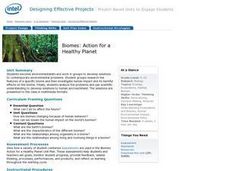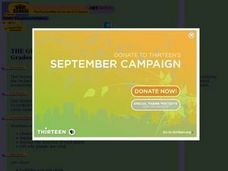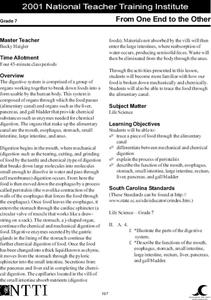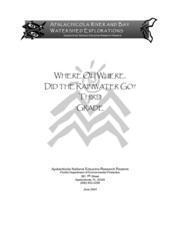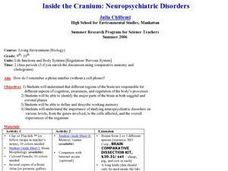Curated OER
Mammals: Mammals and Their Ways
Young scholars, in groups, observe, collect data, and analyze mammal behaviors.
Curated OER
What Happened to Robin?
Students investigate animal injuries caused by humans. They present their findings to various neighborhood groups.
Curated OER
Biomes: Action for a Healthy Planet
Students become environmentalists. They develop solutions to modern environmental problems.
Curated OER
The Grand Glands
Learners extend their knowledge of the endocrine system through in depth examination utilizing the technology of video. They play a game where they have to identify a variety of glands once they're given clues.
Curated OER
Our Savage Planet in the News
Students research volcanoes, storms, atmospheric conditions and extreme environments. They collect information and create a simulation of a science newscast. They watch a video and write a letter as an eyewitness to an avalanche.
Curated OER
1st Grade - Act. 22: Retelling the Tiny Seed
First graders write sentences and illustrate ways seeds travel.
Curated OER
From One End to the Other
Seventh graders trace a piece of food through the digestive system. They describe the functions of the mouth, esophagus, stomach, etc.
Curated OER
Cruzin' to the Arctic
Students, in groups, study life in the Arctic Region and connect their own life experiences to the experiences of students in the Arctic.
Curated OER
Scientists
Students discuss a number of career possibilities in science. They also examine a scientist's work.
Curated OER
Garden Grid
Basically, your class reads about different garden plants from an included handout and seed packets that you provide, and then uses a grid to plan out where to place the plants. They can practice counting with the seeds, grouping,...
Curated OER
The Pickle "Dill"emma
High schoolers study a problem in their local farming community regarding a pickle factory, and the class is asked to help determine if the pickle factory is the source of a seed germination problem.
Curated OER
Polluting the Environment
Fourth graders construct mini-ecosystem, pollute the ecosystem, observe, collect, and record data on the effects of these pollutants on their ecosystem, organize data on spreadsheets, create graphs, and design presentations to share with...
Curated OER
The Monarch Watch
Students collect and examine the life cycle of monarch butterflies. They also tag butterflies and release them as part of a nation-wide project to study monarch butterfly migration.
Curated OER
Biotechnology and The Chocolate Milk Cow
Students discuss new discoveries that have resulted from the use of recombinant DNA technology and otehr biotechnology. In groups, they create a transgenic cow capable of producing chocolate-flavored milk.
Curated OER
Teen Angst
Students gain a broader understanding of new scientific research about the life cycle of the Tyrannosaur, and translate their knowledge into the creation of an illustrated studenT book produced and created by the entire class.
Curated OER
100% Recyclable
Seventh graders research recycling activities at schools across the country using e-mail. They research the waste management and recycling program at their school and problem solve to create an environmentally sound program for the future.
Curated OER
Performance Art and The Waste Stream
Students research local waste management services, discuss findings, give opinions about what they have found, offer solutions and ideas, and create performance art, design art works, and fine art works to convey information on waste...
Curated OER
Where Oh Where Did the Rainwater Go?
Third graders conduct an experiment to determine how water moves through different soils found in the Apalachicola River watershed. They read a scenario, conduct the experiment, answer follow-up questions, and draw the water movement...
Curated OER
Runaway Greenhouse Effect Exercise
Students role-play biologists, coal geologists, space warfare experts, astronomers, pollution-control scientists, and hydrophysicists as they answer the question, "Why is Venus so much hotter than the Earth?"
Curated OER
Get into the Flow with an Interactive Volcano
Students research the structural elements of a volcano. They make a PowerPoint slide that contains five facts which will be added to a whole class slideshow. They add an interactive table of contents using action buttons.
Curated OER
Modeling Earthquake Data
Students evalute evolutionary theories and processe of Geology. They examine evidence that the movement of continents has had signicicant global impact, major geological events. Students evaluate the forces which shape the lithosphere...
Curated OER
Inside the Cranium: Neuropsychiatric Disorders
Students analyze different regions of the brain which are responsible for different aspects of cognition, awareness and regulating the body's process.
Curated OER
What is the purpose of Karyotyping?
Young scholars explain how karyotyping is used to diagnose specific genetic disorders. They use karyotypes to make observations and analyze chromosomal errors. This activity can be completed online or without computer access.
Curated OER
Learning the Structure and Function of DNA
Young scholars read about Humane Genome Project, examine structure and function of DNA, and participate in gel-electrophoresis lab. They complete Internet activity to test their knowledge of DNA.




